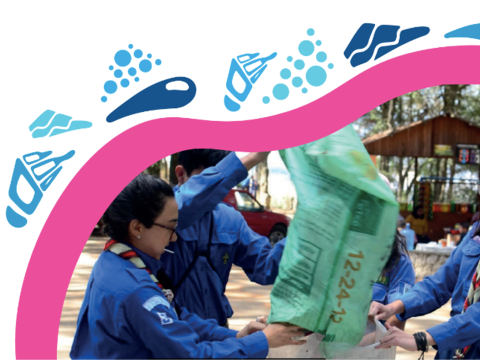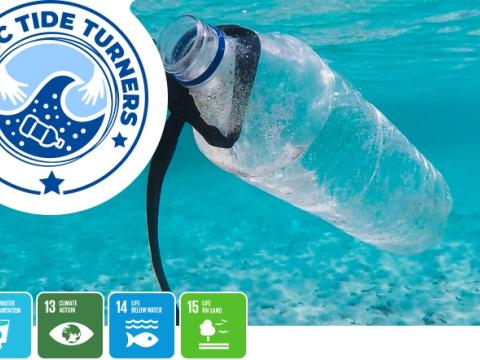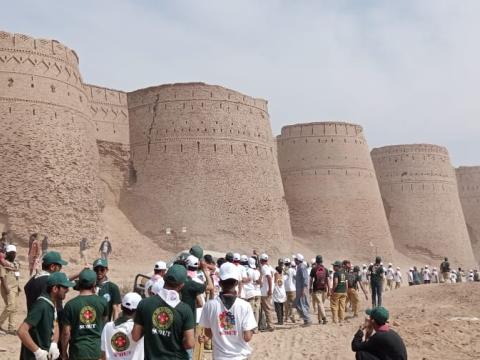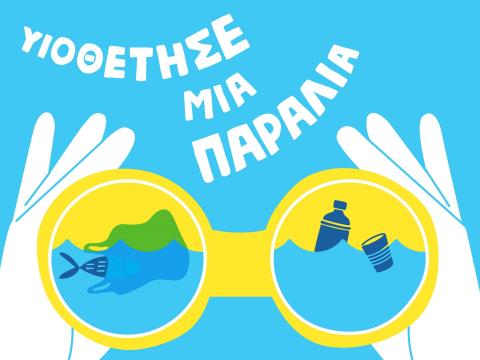Small changes, big impact for Guatemala’s plastic waste

Sandwiched between the Gulf of Honduras and the Pacific Ocean, the beautiful and mountainous land of Guatemala is blessed with a diverse climate. Dotted with volcanoes, rivers, lakes, and heritage sites, the country offers a wealth of culture, history and jaw-dropping landscapes.
Despite this, plastic pollution is at an all-time high. At one point, the Guatemala City garbage dump was the biggest landfill in Central America.
In a bid to combat growing levels of waste, the National Scout Organization of Guatemala launched a youth movement to fight plastic pollution. The Tide Turners Plastic Challenge, developed by World Scouting in collaboration with the United Nations Environment Programme, is designed to inspire young individuals to reflect on their plastic consumption, find solutions to reduce it, and lead positive change in their homes, communities, institutions, and offices.
Raising a global earth tribe
With support from the Interamerican Scout Region, young Scout Leaders, like Elena Motta, stepped in to spearhead the planning and implementation of the plastic challenge across Guatemala. With a team of young people aged between 15 and 20, Elena joined ranks with many other Scouts who have demonstrated that youth are often the best ambassadors for a better world.
Elena was tasked with turning the challenge’s manual, which was designed for older youth, into something that can be used and understood by children aged four to six.
“We have Scouts who are as young as four, and the manuals are not designed for those under the age of seven. It was interesting to figure out how to simplify the activities without losing their importance and impact, especially when challenges had to be done virtually during the pandemic,” Elena explained enthusiastically.
A crucial part of repackaging the manuals lay in maintaining Guatemala’s unique cultural heritage. Historically, Guatemala’s indigenous communities have had deep connections with nature, often centring their values around recognition of the interdependence between people, the environment, and all living species.
Using this as guidance, Elena and her team developed a series of challenges for Scouts to complete, from conducting research and measuring plastic usage, to designing and implementing projects that address and reduce the impact of plastic in communities.
Each accomplishment would bring a Scout closer to joining the global Earth Tribe community, an educational journey for environmental change that the Tide Turners Plastic Challenge is a part of. To qualify, Scouts must complete three levels: Tzolom (to be aware), Xkab'il (to cooperate), and Jolominel (to take action).
Young environmental champions
 As of early 2022, more than 2,000 young Scouts have completed the Tide Turners Plastic Challenge in Guatemala. Motivated by their new knowledge of plastic waste, both young children and youth alike firmly understand that the negative actions can cause irreversible damage to our planet and way of life.
As of early 2022, more than 2,000 young Scouts have completed the Tide Turners Plastic Challenge in Guatemala. Motivated by their new knowledge of plastic waste, both young children and youth alike firmly understand that the negative actions can cause irreversible damage to our planet and way of life.
Through the challenge, the Scouts developed new ways of thinking and living. For some, it provided opportunities to be part of a bigger solution. What started off as a simple plastic audit led to eye-opening moments. Informative workshops and other interactive activities also helped young participants improve their public speaking skills, especially when persuading people within their communities to adopt the 4Rs: reuse, reduce, recycle, and refuse.
Their awareness and creativity were also tested, as they needed to come up with ways to reduce waste. Plastic bags, for example, were replaced with those made of cloth or leaves from palm, banana or maxán plants.
While it may not seem like much, Elena believes every step forward brings us closer to a brighter future.
“These manuals have activities that may only make small changes, but they are still positive changes nonetheless,” she said, adding that recent nationwide lockdowns, due to COVID-19, allowed her to reflect on the Scout Law and that a Scout makes good use of their time and is careful with possessions and property.
She also shared how working on the manual had led to some immediate behavioural changes, not just in her but also in other Scouts who took part in the challenge. Some have completely avoided single-use plastics, while others started reusing plastic containers and bringing reusable water bottles and bags from home.
Every action counts
 While Guatemala’s plastic pollution landscape remains bleak, there are signs of progress.
While Guatemala’s plastic pollution landscape remains bleak, there are signs of progress.
In 2016, San Pedro La Laguna, located on the shores of one of the country’s largest freshwater lakes, banned the sale and distribution of single-use plastics. Shoppers at the local markets will be sold meat wrapped in banana leaves, reusable rubber baskets beautifully handcrafted by local artisans and warm tortillas packaged in cloth napkins.
This change was initially resisted by locals because single-use plastics were so convenient and had become an indispensable part of their lives. But soon, a domino effect was felt in other towns and cities in Guatemala, with at least five municipalities introducing similar bans.
Policy changes like these give Elena hope for the future.
“With the Tide Turners Plastic Challenge, we believe that every little action counts. It’s a good step in the right direction when more people take up the challenge and create a similar spill over effect within their neighbourhoods and communities,” she said.
“The challenge is still ongoing here in Guatemala. We believe it will be much easier in 2022 to implement any initiatives and plans we have. The goal is always to increase awareness among the young people and be the solution within our communities.”


